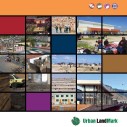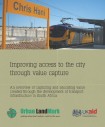Location
The Knowledge Exchange is a response to an identified need for increased information exchange in the Southern African region. It has been developed as a broad collaboration of partners, with the CSIR acting as the custodian.
The purpose of the Urban Knowledge Exchange is to improve the delivery of better quality human settlements, towns and cities by making reliable, evidence-based knowledge more widely accessible. It encompasses thematic areas such as sustainable human settlement development and management, better infrastructure and services, access to well-located land, efficient shelter production, a more functional residential property market, improved transport networks, more equitable urban development, good governance, building resilience and responding to climate change, and promoting more affordable housing finance.
The knowledge repository is devoted to promoting innovation and good practice for cities, towns, and villages through offering links to an online library, knowledge directory, upcoming events, moderated debates, portal (links to further hubs), and content uploading facility. With the aim to collaborate with existing platforms on various locational scales the project will further provide opportunities for global information sharing.
Members:
Resources
Displaying 21 - 25 of 45Maputo and informal land tenure arrangements
This case study draws on research that investigated the extensive informal land market in Maputo, Mozambique; specifically, how urban land is transacted and the mechanisms by which it is secured. The case study is based on a research study managed by Caroline Wanjiku Kihato and Lauren Royston, and undertaken by José Alberto Raimundo (Universidade Pedagógica, Maputo) and Inês Macamo Raimundo (Universidade Eduardo Modlane, Maputo). The work received technical and financial support from Urban LandMark.
Guidelines for the identification of well-located land for human settlements
This guide has been written as the first step towards concretising and standardising the process involved in the identification and assessment of well-located land for human settlement. The
Managing urban land
Urban land markets have a profound effect on how well poor households are able to access the jobs, amenities and services offered in the city. But often the way in which this market works frustrates attempts to open up better located living and business opportunities for poorer urban households and communities, despite government policies and programmes intended to address these challenges. The challenge in South Africa is even larger because of worsening poverty and inequality, and the continuing growth of cities through urbanisation.
Improving access to the city through value capture
Cities attribute much of their economic expansion to the development of transit systems that link people efficiently to jobs. However, many of South Africa's cities lack modern mass transit systems for transporting commuters. Partly as a result, South Africans, especially low-income workers, spend a high share of their disposable income on transport.
Investigation into the delays in issuing title deeds to beneficiaries of housing projects funded by the capital subsidy
The Department of Human Settlements reports that between 1994 and 2009, 2.94-million housing units and serviced sites have either been built or were under construction. By September 2010, 1.44-million of these properties were formally registered on the Deeds Registry. This means that about 50% of subsidy beneficiaries had not yet received formal title for their housing. Moreover, since 2005, the percentage of subsidy properties that have been formally registered per year has plummeted.





